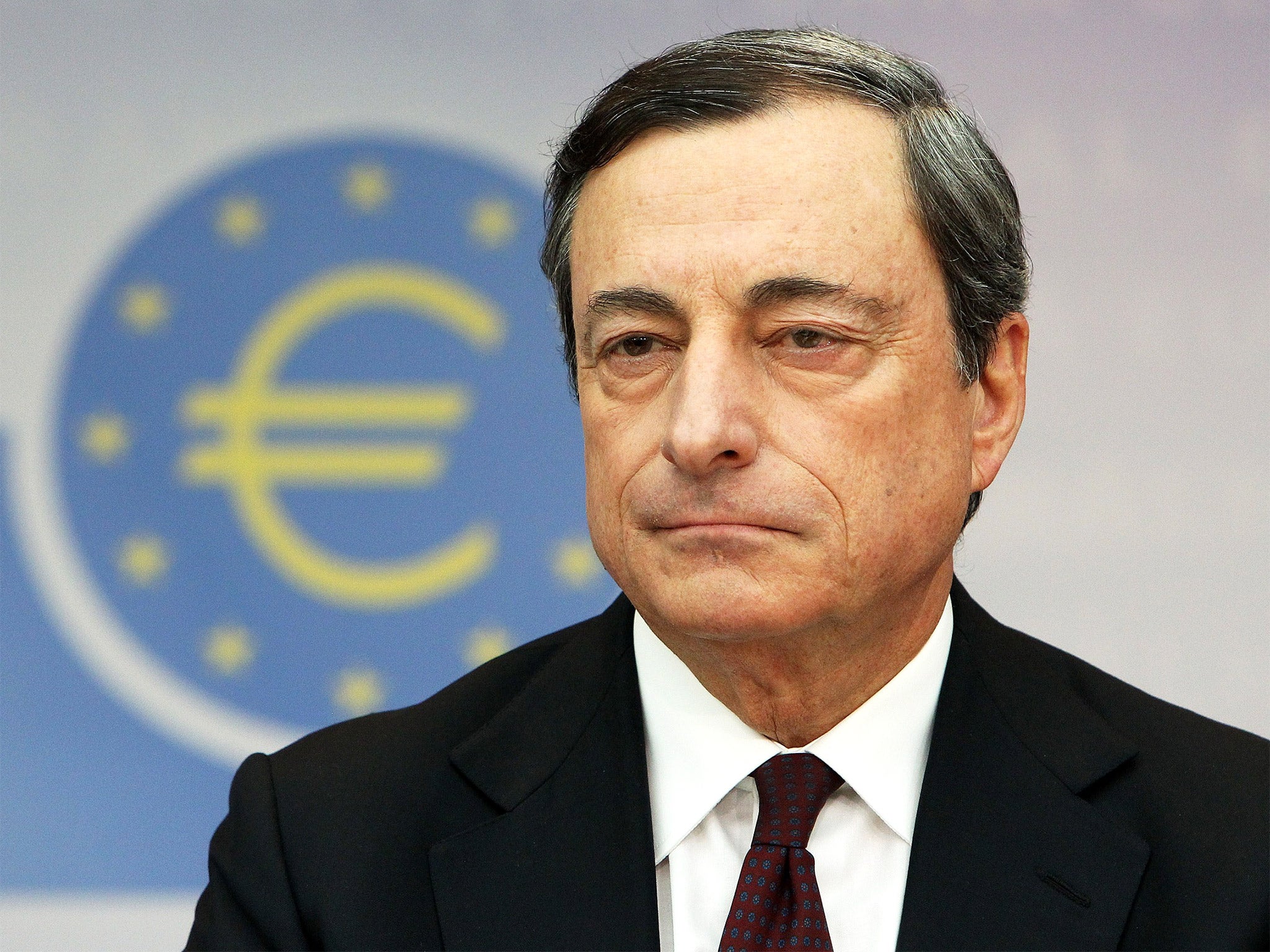Mario Draghi is feeding European delusions about a recovery
Das Capital: The ECB’s latest actions point to its failure to restore growth or raise inflation

Investors were disappointed when they unwrapped the European Central Bank’s early Christmas present.
The package was not insignificant: a cut in deposit rates by 0.10 per cent from negative 0.20 per cent to 0.30 per cent; a six-month extension of its €60bn a month bond purchase programme; a commitment to reinvest repayments on its holdings in further bonds; and expansion of the range of securities to be purchased to include regional and local government debt.
Shortly after the 3 December announcement, the ECB president Mario Draghi found himself questioned by Lord King, the former head of the Bank of England against a background of derisive audience laughter. Asked why his “forward guidance” had failed to reassure markets this time, the uncomfortable ECB president could only respond that his words did not have the same effect as his famous 2012 promise to do “whatever it takes” to save the eurozone because “it was not the same words”.
In reality, the rise in eurozone market rates and the euro in the wake of the ECB’s meeting will reverse. The expected increase in US rates today will help. Subsequent promises by Mr Draghi of unlimited quantitative easing if needed will mollify investors.
But the necessity for the ECB’s new actions points to its failure to restore growth or raise inflation.
First, Europe did avoid a double dip recession in 2014 but economic activity remains weak. The eurozone has lost momentum, expanding a mere 0.3 per cent in the three months to September. Unemployment remains above 20 per cent in weaker economies, and inflation is near zero.
Second, the improvements are cyclical – the effect of low oil prices and the relaxation of fiscal policy as Brussels has turned a blind eye to members failing to adhere to budget deficit targets. The ECB’s programme has benefitted Europe primarily through the weakening of the euro. But the improvement in exports may be unsustainable. Weakness in emerging markets affects about 25 per cent of eurozone exports. The eurozone has a current account surplus of 3.7 per cent of GDP, the largest in the world. Trading partners are unlikely to indefinitely absorb European surpluses.
Third, ECB actions do not address crucial issues. Debt levels remain elevated and new lending has not recovered. Lack of demand rather than liquidity limits new lending. In addition, euro interest rates for companies and households remain relatively high, around 2 per cent, despite negative inter-bank rates.
Another constraint is non-performing loans, which have doubled since 2009 to total €1trn-€1.2trn (9 per cent of GDP). They are concentrated among small and medium-sized firms, which are responsible for two-thirds of Europe’s output and employment.
Fourth, the fundamental problems of the single currency and uniform monetary policy remain unresolved. Finland is set to hold a parliamentary hearing into continued euro membership shortly. The British referendum on EU membership is due in 2017.
Despite Mr Draghi’s insistence of the unlimited extent of his powers, the ECB is likely to face increasing constraints. The weaker than expected actions this month may reflect divisions within its governing council, where German, Dutch and other members are known to oppose greater activism. It also faces practical limits. It will increasingly find it difficult to buy bonds as it runs up against its single issuer and concentration limits. It can only purchase debt above its deposit facility rate and with more government bonds trading at ever lower yields, the available universe of bonds may shrink.
The ECB also faces external pressures. Negative deposit rates have triggered large capital outflows, around €500bn, pushing the euro lower. This helps eurozone exporters but does not increase the area’s contribution to global demand. This beggar-thy-neighbour policy is unsustainable and will intensify the currency wars that Mr Draghi insists are not taking place.
Continued weakness in commodities and industrial overcapacity mean deflationary pressures will persist, making the ECB’s inflation target unattainable. Problems of refugees, terrorism, Russian revanchism and domestic politic al tensions also hit business and consumer confidence.
In the final analysis, the ECB’s actions promote false hopes for a timely eurozone recovery. As Sigmund Freud observed: “Illusions commend themselves to us because they save us pain and allow us to enjoy pleasure instead. We must therefore accept it without complaint when they sometimes collide with a bit of reality against which they are dashed to pieces”.
Satyajit Das is a former banker and author whose latest book A Banquet of Consequence will be released internationally in February 2016
Subscribe to Independent Premium to bookmark this article
Want to bookmark your favourite articles and stories to read or reference later? Start your Independent Premium subscription today.

Join our commenting forum
Join thought-provoking conversations, follow other Independent readers and see their replies